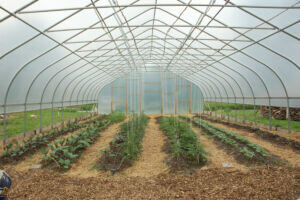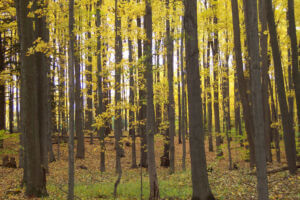Conservation Districts Continue to Deliver for Michigan Communities, While Advocating for Stronger Support and Funding
By Rivka Hodgkinson
Public trust and transparency are foundational to our shared work of protecting Michigan’s land, water, and natural resources. The Michigan Association of Conservation Districts (MACD) represents a statewide network of community-led agencies that have served Michigan for over 80 years. Recent media reports have raised concerns about governance and accessibility within Conservation Districts. Unfortunately, these reports omit critical context about Districts’ connection to communities, fiscal accountability, and the long-standing impact of their work.
In Fiscal Year 2022 alone, Michigan’s Conservation Districts hosted 1,791 outreach events reaching over 129,000 people and attended 1,146 local government meetings to share the work of local conservation districts. From helping farmers adopt resilient farming practices to restoring habitats, preventing erosion, protecting and restoring watersheds, and controlling invasive species, Conservation Districts are a vital and highly active part of our communities.

One of the reasons I became active in the Conservation Districts was to bring my 17 years of marketing and communications experience to help tell a bigger story. Conservation Districts are doing incredible work in every corner of Michigan, and my goal is to make sure more people see it, understand it, and are invited to be part of it.
Conservation Districts are subject to Michigan’s Open Meetings Act and FOIA, and operate under multiple layers of oversight. Most District funding comes from competitive state and federal grants. Each of these comes with stringent requirements for deliverables, reporting, and auditing. This ensures taxpayer dollars are held to a high standard of accountability.
Elections for local boards, including Conservation Districts, often face low turnout across Michigan. This is particularly true in rural areas. This is not unique to Districts, but rather a challenge common to many local public offices. District elections are held in accessible community spaces, ranging from libraries and township halls to nature centers and historical farms. For instance, the Midland Conservation District’s election was held in a beautifully restored historic barn, which is regularly used for public education and outreach events. These venues reflect the resourceful and community-embedded nature of District operations, rather than a lack of professionalism. Conservation District elections also offer an absentee voting option.
Many of the challenges cited in recent reporting stem from a long-standing issue: the lack of stable and adequate operational funding. State funding for District operations was eliminated in 2008 and not restored until 2022. For over a decade, Districts were expected to sustain essential public services using only project-based grants, creating gaps in staff capacity, training, and board development. Tremendous progress has been made since receiving this critical state investment in 2022; however, more support is needed to ensure long-term success and ongoing resilience.
MACD and our partners at the Michigan Department of Agriculture and Rural Development (MDARD) are actively working to strengthen governance, support board training, and improve election processes across all districts. Significant enhancements are already underway or have been successfully implemented, including advanced training for Directors, strengthened collaboration and mentorship across districts, and upgraded communications and marketing resources to support district managers. We welcome opportunities for partnership and public engagement.
Conservation Districts are not hiding; rather, they are out in the fields, forests, and communities every day. We invite Michiganders to attend local meetings, consider joining their local District board, and support the mission of protecting our shared natural resources. With increased public awareness, stronger investment, and community involvement, Conservation Districts will continue to be a trusted and effective force for conservation across Michigan.


